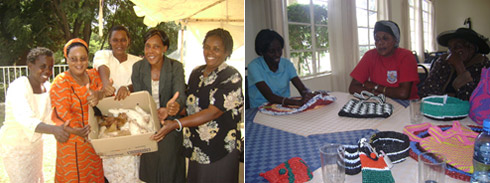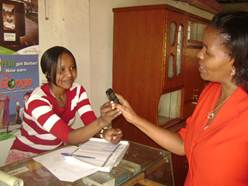In the latest in our guest blog series, Dr Ndunge Kiiti of Houghton College, New York describes findings of her research into the impact of mobile money services for female poverty reduction in Kenya. Her blog entries provide further evidence as to how commercial mobile services bring social and economic benefits to women and their communities.
 Dr Ndunge Kiiti
Dr Ndunge Kiiti
Over the past seven months, my colleague Dr. Jane Mutinda from Kenyatta University in Kenya and I have been studying how mobile money services impact poverty reduction in rural Eastern Kenya. So far we’ve seen that Safaricom’s mobile money service M-PESA has proved very popular amongst women’s groups and today I’ll be sharing with you insights into this phenomenon, from the research process which included a workshop. The workshop brought together representatives from the women’s groups with M-PESA staff to share thoughts on the benefits and challenges presented by the service and ways users can improve their experience.
Profiles of the Women’s Groups
Gross inequalities exist between men and women in Kenya. These gaps and inequalities are evident in access and control of resources, economic opportunities and power, and political voice. For example, an estimated 95% of all land holdings in Kenya are owned by men,; while women own only 5% (UNDP & UNIFEM, 2005, p. 11). These challenges have translated into high levels of poverty, mainly concentrated among women in rural areas. According to the Central Bureau of Statistics, the Eastern Province of Kenya is one of the poorest regions of the country. Among the many drivers of poverty in this region is lack of information about socio-economic services, rights and obligations is key and this problem especially affects women.
The 21 women’s groups we studied are working on addressing poverty from social, economic, and psychological perspectives. Currently, all the groups have savings accounts (as a group and many as individuals) and some form of financial investments. Additionally, most of the groups continue using the Merry-Go-Round system, a basic example of what Stuart Rutherford (1999) calls the Rotating Savings and Credit Associations or ROSCAs. These are a form of lottery where members save a fixed amount every period (weekly or monthly, for example) and the total amount saved during a given period is given to one member of the association, either based on need or randomly.

Women’s Group hold up poultry raised for income and display crafts made for sale
From our research, it is clear that mobile money services are central to the success of these groups. Each of the groups uses M-PESA as their main avenue for transactions, as individuals and groups. As one group member put it, “The use of M-PESA has been extremely beneficial to many people.” Many of the group members expressed that they couldn’t imagine not having access to M-PESA as a service.
Benefits of M-PESA
A key reason we found for the service’s popularity was that M-PESA was the initial service introduced to rural areas. Therefore it already serves a large portion of the population that has no access to banking services and clearly builds on the social ties that exist across urban and rural areas in Kenya.
For the women’s group activities, it was clear that M-PESA assists in facilitating group payments, especially for members who might live away from their groups or be traveling during the monthly meetings. For example, although all the groups have their base in the rural areas, some group members live in urban areas because of family commitments or employment opportunities. M-PESA allows them to still contribute to their group although they are not always physically there. As one group mentioned, “People are able to pay their dues on time even if they are not present.” This efficiency is perceived as essential to group planning. “It enables us to plan….what we want to do with that money and whatever we wanted to do is done.”
M-PESA also assists some of the groups with their microfinance transactions, whether they are purchasing or selling a product for their businesses. In one of the group discussions, this was highlighted, “On the side of purchasing goods, it’s like we have been freed from traveling by vehicles. We just send the money and the goods are delivered to us….you have paid for everything including transport.” This was also mentioned in the context of supporting rural businesses. There was strong support for M-PESA as a service that promotes more economic transactions in the rural areas; thus leading to rural development and arguably, the reduction of poverty.
In addition, from a basic usage standpoint, the women emphasized that M-PESA is convenient, safe, accessible, efficient and affordable. The fact that M-PESA creates opportunities for employment was also viewed as a positive aspect of the service.

A M-PESA outlet owned by a member of women’s group
However, there were some challenges in relation to their use of the M-PESA services that the women highlighted. The following were most frequently described.
Challenges
Fraud
Several of the women had lost money to fraud. The most common type of fraud was receiving a call or SMS from an individual who claims they have sent money to your M-PESA account by mistake. They usually request you to send it back to them. One group member explained a personal experience with fraud: “For example, last week I got three SMS messages continuously; same number, one minute between each. They were asking me to confirm that I had received several amounts of money. At the end it said ‘your M-PESA now is eight thousand. And in my phone I knew I had about two thousand. So immediately, I knew ….it was a hoax.”
Network/Connectivity Problems
In rural areas network reception can create challenges. One group member explained the problem they often face, ‘The network is low, so you are told, “there is no network”…..which means today there is no M-PESA. So you find you wanted to send that money quickly but it can’t go because of the network.’ This seems to be a key problem in very remote areas.
Cost
The general cost of M-PESA services seemed to be accepted. The cost issue was mainly highlighted because of the high levels of poverty, especially in rural areas. Even though the service is greatly appreciated for its convenience and security, the charge is often viewed as an additional cost that uses resources that could be used elsewhere. One woman noted the additional cost , “If you send money through the M-PESA to the treasurer [of the women’s group], you should send with the money for removing it.”
Services for Special Populations
Some of the elderly women emphasized that sometimes their main challenge is the inability to read and that often translates to having to give out their personal information, recognizing that it could be used for fraud. This issue was also expressed by the group with members with visual impairments. One of the respondents who lived with sight problems shared her concern: “The phones which are available nowadays, they are not audible, they don’t talk. You can’t operate it in a manner that it can tell you everything, so it’s easy for a person to read for you the wrong money figure that is in the phone account and take a share of what is there.”
They made a request to the M-PESA staff, to advocate and push for the development of more products and services that are friendly to special populations.
Group Communication Dynamics
The irony of the M-PESA service is that it can impact group communication and interaction both positively and negatively. On one hand, it allows for money to be sent to facilitate planning at meetings, even if a member needs to be absent. On the other hand, as one member put it, “Many people feel that they can fail to attend the group meetings as long as they send the money.” Most groups charge a fee if monthly contributions are sent late. Thus, most group members would be inclined or motivated to send their payments in on time. M-PESA helps facilitate this. However, some groups argued this can perpetuate the lack of meeting attendance, thus, limiting the social aspects of the group meeting and affecting the socio-psychological support that comes from face to face group interactions.
Although there were numerous challenges mentioned, the groups made it clear that the benefits outweighed the disadvantages, summarized by one respondent: “The positives are more than the negatives.”
How did M-PESA respond? Check back next week to learn what M-PESA service providers said in response to the feedback given in Dr Kiiti’s workshop.

